Choose the incorrect match:
1)
Gigantism — High secretion of GH before puberty
2)
Acromegaly — High secretion of GH after puberty
3)
Dwarfism — Low level of GH before puberty
4)
Exopthalmic goitre — Low secretion of thyroxine after puberty
Gigantism — High secretion of GH before puberty
Acromegaly — High secretion of GH after puberty
Dwarfism — Low level of GH before puberty
Exopthalmic goitre — Low secretion of thyroxine after puberty
To solve the question, we need to analyze each option and determine whether the descriptions match the conditions they refer to.
1. Understanding Gigantism:
- Gigantism is caused by high secretion of growth hormone (GH) before puberty. This is correct as excess GH during childhood leads to excessive growth.
2. Understanding Acromegaly:
- Acromegaly results from high secretion of growth hormone after puberty. This is also correct as it leads to abnormal growth of bones and tissues in adults.
3. Understanding Dwarfism:
- Dwarfism is associated with low levels of growth hormone before puberty. This is accurate since a deficiency in GH during childhood leads to short stature.
4. Understanding Exophthalmic Goitre:
- Exophthalmic goitre is characterized by hypersecretion of thyroid hormones (not low secretion) and is often associated with Graves' disease. The statement that it is due to low secretion of thyroxine after puberty is incorrect.
Conclusion:
The incorrect match is option 4: "Exophthalmic goitre — Low secretion of thyroxine after puberty."
Final Answer:
Option 4 is the incorrect match.
---
- Gigantism is caused by high secretion of growth hormone (GH) before puberty. This is correct as excess GH during childhood leads to excessive growth.
- Acromegaly results from high secretion of growth hormone after puberty. This is also correct as it leads to abnormal growth of bones and tissues in adults.
- Dwarfism is associated with low levels of growth hormone before puberty. This is accurate since a deficiency in GH during childhood leads to short stature.
- Exophthalmic goitre is characterized by hypersecretion of thyroid hormones (not low secretion) and is often associated with Graves' disease. The statement that it is due to low secretion of thyroxine after puberty is incorrect.
The incorrect match is option 4: "Exophthalmic goitre — Low secretion of thyroxine after puberty."
Option 4 is the incorrect match.
Topper's Solved these Questions
Similar Questions
Choose the incorrect match:
1) Cretinism- Deaf mustim due to hyposecretion of thyroxine
2) Goitre- Enlargement of thyroid gland due to hyperscretion of TSH
3) Diabetes insipidus- Diuresis due to hyposecretion of ADH
4) Myopia- This defect can be overcome by using convex lens
View SolutionRead the following statements. Statement -A : Giagantism and acromicria are both caused due to over secretion of growth hormone. Statement-B : Gigantism occurs due to overactivity of pituitary before puberty while acromocria occurs due to pituitary hyposecretion after pubrty. Choose the correct option.
View Solution
Knowledge Check
How Do You Like Those Apples? Marketed as SmartFresh, the chemical 1-MCP (1-methylcyclopropene) has been used by fruit growers since 2002 in the United States and elsewhere to preserve the crispness and lengthen the storage life of apples and other fruit, which often must travel long distances before being eaten by consumers. 23 1-MCP lengthens storage life by three to four times when applied to apples. This extended life allows producers to sell their apples in the off-season, months after the apples have been harvested. And at a cost of about one cent per pound of apples, 1-MCP is a highly cost-effective treatment. However, 1-MCP is not a panacea for fruit producers or sellers: there are problems and limitations associated with its use.[1] 1-MCP works by limiting a fruit’s production of ethylene, 24 it is a chemical that causes fruit to ripen and eventually rot. [2] While 1-MCP keeps apples 25 tight and crisp for months, it also limits 26 their scent production. [3] This may not be much of a problem with certain kinds of apples that are not naturally very fragrant, such as Granny Smith, but for apples that are prized for their fruity fragrance, such as McIntosh, this can be a problem with onsumers, 27 that will reject apples lacking the expected aroma. [4] But some fruits do not respond as well to 1-MCP as others 28 did, and some even respond adversely. [5] Furthermore, some fruits, particularly those that naturally produce a large amount of ethylene, do not respond as well to 1-MCP treatment. [6] Take Bartlett 29 pears, for instance, unless they are treated with exactly the right amount of 1-MCP at exactly the right time, they will remain hard and green until they rot, and consumers who experience this will be unlikely to purchase them again. 30 Finally, researchers have found that 1-MCP actually increases susceptibility to some pathologies in certain apple varieties. For example, Empire apples are prone to a condition that causes the flesh of the apple to turn brown. Traditionally, apple producers have dealt with this problem by leaving the apples in the open air for three weeks before storing them in a controlled atmosphere with tightly regulated temperature, humidity, and carbon dioxide levels. As the graph shows, the flesh of untreated Empire apples that are first stored in the open air undergoes 31 roughly five percent less browning than the flesh of untreated Empire apples that are immediately put into storage in a controlled environment. However, when Empire apples are treated with 1-MCP, 32 their flesh turns brown when the apples are first stored in the open air, though not under other conditions. Although researchers continue to search for the right combination of factors that will keep fruits fresh and attractive, 33 the problem may be that consumers are overly concerned with superficial qualities rather than the actual freshness of the fruit.
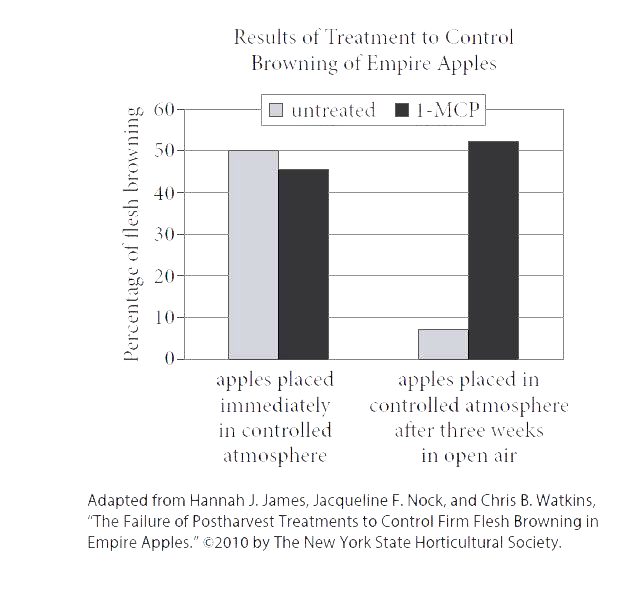
Which choice most effectively combines the underlined sentences?AWhen applied to apples, 1-MCP lengthens storage life by three to four times, allowing producers to sell their apples in the off-season, months after the apples have been harvested.BProducers are allowed to sell their apples months after they have been harvested—in the off-season—because 1-MCP, when applied to apples, lengthens their storage life by three to four timesC1-MCP lengthens storage life, when applied to apples, by three to four times, allowing producers to sell their apples months after the apples have been harvested in the off-season.DMonths after apples have been harvested, producers are allowed to sell their apples, in the off-season, because 1-MCP lengthens storage life when applied to apples by three to four times.How Do You Like Those Apples? Marketed as SmartFresh, the chemical 1-MCP (1-methylcyclopropene) has been used by fruit growers since 2002 in the United States and elsewhere to preserve the crispness and lengthen the storage life of apples and other fruit, which often must travel long distances before being eaten by consumers. 23 1-MCP lengthens storage life by three to four times when applied to apples. This extended life allows producers to sell their apples in the off-season, months after the apples have been harvested. And at a cost of about one cent per pound of apples, 1-MCP is a highly cost-effective treatment. However, 1-MCP is not a panacea for fruit producers or sellers: there are problems and limitations associated with its use.[1] 1-MCP works by limiting a fruit’s production of ethylene, 24 it is a chemical that causes fruit to ripen and eventually rot. [2] While 1-MCP keeps apples 25 tight and crisp for months, it also limits 26 their scent production. [3] This may not be much of a problem with certain kinds of apples that are not naturally very fragrant, such as Granny Smith, but for apples that are prized for their fruity fragrance, such as McIntosh, this can be a problem with consumers, 27 that will reject apples lacking the expected aroma. [4] But some fruits do not respond as well to 1-MCP as others 28 did, and some even respond adversely. [5] Furthermore, some fruits, particularly those that naturally produce a large amount of ethylene, do not respond as well to 1-MCP treatment. [6] Take Bartlett 29 pears, for instance, unless they are treated with exactly the right amount of 1-MCP at exactly the right time, they will remain hard and green until they rot, and consumers who experience this will be unlikely to purchase them again. 30 Finally, researchers have found that 1-MCP actually increases susceptibility to some pathologies in certain apple varieties. For example, Empire apples are prone to a condition that causes the flesh of the apple to turn brown. Traditionally, apple producers have dealt with this problem by leaving the apples in the open air for three weeks before storing them in a controlled atmosphere with tightly regulated temperature, humidity, and carbon dioxide levels. As the graph shows, the flesh of untreated Empire apples that are first stored in the open air undergoes 31 roughly five percent less browning than the flesh of untreated Empire apples that are immediately put into storage in a controlled environment. However, when Empire apples are treated with 1-MCP, 32 their flesh turns brown when the apples are first stored in the open air, though not under other conditions. Although researchers continue to search for the right combination of factors that will keep fruits fresh and attractive, 33 the problem may be that consumers are overly concerned with superficial qualities rather than the actual freshness of the fruit.
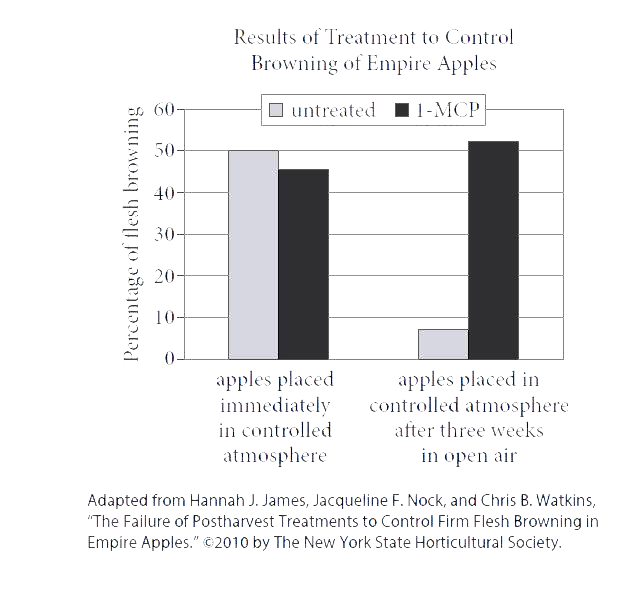 ANO CHANGEBfirmCstiffDtaut
ANO CHANGEBfirmCstiffDtautHow Do You Like Those Apples? Marketed as SmartFresh, the chemical 1-MCP (1-methylcyclopropene) has been used by fruit growers since 2002 in the United States and elsewhere to preserve the crispness and lengthen the storage life of apples and other fruit, which often must travel long distances before being eaten by consumers. 23 1-MCP lengthens storage life by three to four times when applied to apples. This extended life allows producers to sell their apples in the off-season, months after the apples have been harvested. And at a cost of about one cent per pound of apples, 1-MCP is a highly cost-effective treatment. However, 1-MCP is not a panacea for fruit producers or sellers: there are problems and limitations associated with its use.[1] 1-MCP works by limiting a fruit’s production of ethylene, 24 it is a chemical that causes fruit to ripen and eventually rot. [2] While 1-MCP keeps apples 25 tight and crisp for months, it also limits 26 their scent production. [3] This may not be much of a problem with certain kinds of apples that are not naturally very fragrant, such as Granny Smith, but for apples that are prized for their fruity fragrance, such as McIntosh, this can be a problem with consumers, 27 that will reject apples lacking the expected aroma. [4] But some fruits do not respond as well to 1-MCP as others 28 did, and some even respond adversely. [5] Furthermore, some fruits, particularly those that naturally produce a large amount of ethylene, do not respond as well to 1-MCP treatment. [6] Take Bartlett 29 pears, for instance, unless they are treated with exactly the right amount of 1-MCP at exactly the right time, they will remain hard and green until they rot, and consumers who experience this will be unlikely to purchase them again. 30 Finally, researchers have found that 1-MCP actually increases susceptibility to some pathologies in certain apple varieties. For example, Empire apples are prone to a condition that causes the flesh of the apple to turn brown. Traditionally, apple producers have dealt with this problem by leaving the apples in the open air for three weeks before storing them in a controlled atmosphere with tightly regulated temperature, humidity, and carbon dioxide levels. As the graph shows, the flesh of untreated Empire apples that are first stored in the open air undergoes 31 roughly five percent less browning than the flesh of untreated Empire apples that are immediately put into storage in a controlled environment. However, when Empire apples are treated with 1-MCP, 32 their flesh turns brown when the apples are first stored in the open air, though not under other conditions. Although researchers continue to search for the right combination of factors that will keep fruits fresh and attractive, 33 the problem may be that consumers are overly concerned with superficial qualities rather than the actual freshness of the fruit.
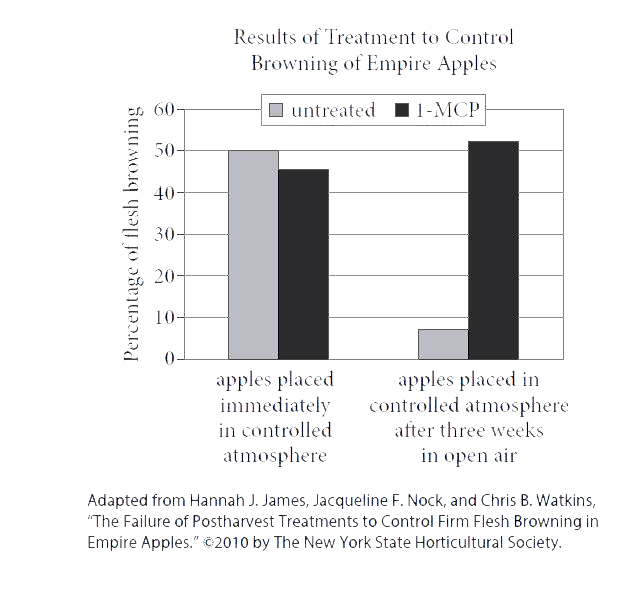
Which choice offers an accurate interpretation of the data in the graph?ANO CHANGEBslightly more browning thanCtwice as much browning asDsubstantially less browning than
Find the incorrect match
1) Monocytes-Agranulocytes
2) Basophils-Secrete sectomyxin
3) Eosinophils-PMNLs
4) Neutrophils-Granulocytes
View SolutionHow Do You Like Those Apples? Marketed as SmartFresh, the chemical 1-MCP (1-methylcyclopropene) has been used by fruit growers since 2002 in the United States and elsewhere to preserve the crispness and lengthen the storage life of apples and other fruit, which often must travel long distances before being eaten by consumers. 23 1-MCP lengthens storage life by three to four times when applied to apples. This extended life allows producers to sell their apples in the off-season, months after the apples have been harvested. And at a cost of about one cent per pound of apples, 1-MCP is a highly cost-effective treatment. However, 1-MCP is not a panacea for fruit producers or sellers: there are problems and limitations associated with its use.[1] 1-MCP works by limiting a fruit’s production of ethylene, 24 it is a chemical that causes fruit to ripen and eventually rot. [2] While 1-MCP keeps apples 25 tight and crisp for months, it also limits 26 their scent production. [3] This may not be much of a problem with certain kinds of apples that are not naturally very fragrant, such as Granny Smith, but for apples that are prized for their fruity fragrance, such as McIntosh, this can be a problem with consumers, 27 that will reject apples lacking the expected aroma. [4] But some fruits do not respond as well to 1-MCP as others 28 did, and some even respond adversely. [5] Furthermore, some fruits, particularly those that naturally produce a large amount of ethylene, do not respond as well to 1-MCP treatment. [6] Take Bartlett 29 pears, for instance, unless they are treated with exactly the right amount of 1-MCP at exactly the right time, they will remain hard and green until they rot, and consumers who experience this will be unlikely to purchase them again. 30 Finally, researchers have found that 1-MCP actually increases susceptibility to some pathologies in certain apple varieties. For example, Empire apples are prone to a condition that causes the flesh of the apple to turn brown. Traditionally, apple producers have dealt with this problem by leaving the apples in the open air for three weeks before storing them in a controlled atmosphere with tightly regulated temperature, humidity, and carbon dioxide levels. As the graph shows, the flesh of untreated Empire apples that are first stored in the open air undergoes 31 roughly five percent less browning than the flesh of untreated Empire apples that are immediately put into storage in a controlled environment. However, when Empire apples are treated with 1-MCP, 32 their flesh turns brown when the apples are first stored in the open air, though not under other conditions. Although researchers continue to search for the right combination of factors that will keep fruits fresh and attractive, 33 the problem may be that consumers are overly concerned with superficial qualities rather than the actual freshness of the fruit.
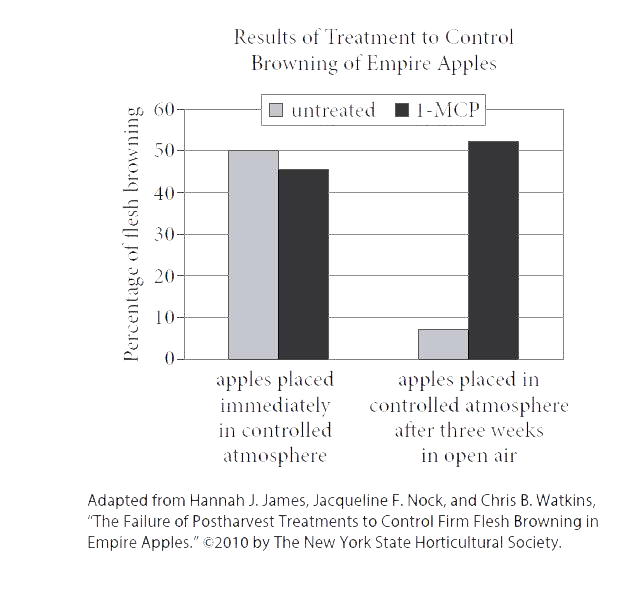
To make this paragraph most logical sentcence 4 should be placed
View SolutionHow Do You Like Those Apples? Marketed as SmartFresh, the chemical 1-MCP (1-methylcyclopropene) has been used by fruit growers since 2002 in the United States and elsewhere to preserve the crispness and lengthen the storage life of apples and other fruit, which often must travel long distances before being eaten by consumers. 23 1-MCP lengthens storage life by three to four times when applied to apples. This extended life allows producers to sell their apples in the off-season, months after the apples have been harvested. And at a cost of about one cent per pound of apples, 1-MCP is a highly cost-effective treatment. However, 1-MCP is not a panacea for fruit producers or sellers: there are problems and limitations associated with its use.[1] 1-MCP works by limiting a fruit’s production of ethylene, 24 it is a chemical that causes fruit to ripen and eventually rot. [2] While 1-MCP keeps apples 25 tight and crisp for months, it also limits 26 their scent production. [3] This may not be much of a problem with certain kinds of apples that are not naturally very fragrant, such as Granny Smith, but for apples that are prized for their fruity fragrance, such as McIntosh, this can be a problem with consumers, 27 that will reject apples lacking the expected aroma. [4] But some fruits do not respond as well to 1-MCP as others 28 did, and some even respond adversely. [5] Furthermore, some fruits, particularly those that naturally produce a large amount of ethylene, do not respond as well to 1-MCP treatment. [6] Take Bartlett 29 pears, for instance, unless they are treated with exactly the right amount of 1-MCP at exactly the right time, they will remain hard and green until they rot, and consumers who experience this will be unlikely to purchase them again. 30 Finally, researchers have found that 1-MCP actually increases susceptibility to some pathologies in certain apple varieties. For example, Empire apples are prone to a condition that causes the flesh of the apple to turn brown. Traditionally, apple producers have dealt with this problem by leaving the apples in the open air for three weeks before storing them in a controlled atmosphere with tightly regulated temperature, humidity, and carbon dioxide levels. As the graph shows, the flesh of untreated Empire apples that are first stored in the open air undergoes 31 roughly five percent less browning than the flesh of untreated Empire apples that are immediately put into storage in a controlled environment. However, when Empire apples are treated with 1-MCP, 32 their flesh turns brown when the apples are first stored in the open air, though not under other conditions. Although researchers continue to search for the right combination of factors that will keep fruits fresh and attractive, 33 the problem may be that consumers are overly concerned with superficial qualities rather than the actual freshness of the fruit.
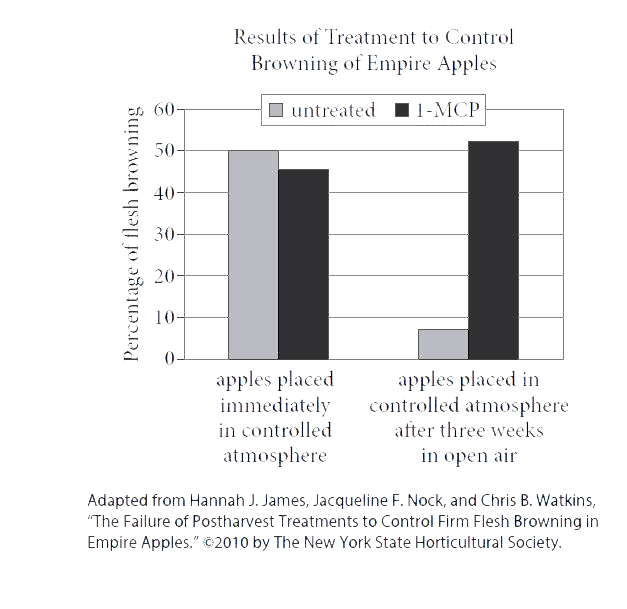
Which choice offers an accurate interpretation of the data in the graph?
View SolutionHow Do You Like Those Apples? Marketed as SmartFresh, the chemical 1-MCP (1-methylcyclopropene) has been used by fruit growers since 2002 in the United States and elsewhere to preserve the crispness and lengthen the storage life of apples and other fruit, which often must travel long distances before being eaten by consumers. 23 1-MCP lengthens storage life by three to four times when applied to apples. This extended life allows producers to sell their apples in the off-season, months after the apples have been harvested. And at a cost of about one cent per pound of apples, 1-MCP is a highly cost-effective treatment. However, 1-MCP is not a panacea for fruit producers or sellers: there are problems and limitations associated with its use.[1] 1-MCP works by limiting a fruit’s production of ethylene, 24 it is a chemical that causes fruit to ripen and eventually rot. [2] While 1-MCP keeps apples 25 tight and crisp for months, it also limits 26 their scent production. [3] This may not be much of a problem with certain kinds of apples that are not naturally very fragrant, such as Granny Smith, but for apples that are prized for their fruity fragrance, such as McIntosh, this can be a problem with consumers, 27 that will reject apples lacking the expected aroma. [4] But some fruits do not respond as well to 1-MCP as others 28 did, and some even respond adversely. [5] Furthermore, some fruits, particularly those that naturally produce a large amount of ethylene, do not respond as well to 1-MCP treatment. [6] Take Bartlett 29 pears, for instance, unless they are treated with exactly the right amount of 1-MCP at exactly the right time, they will remain hard and green until they rot, and consumers who experience this will be unlikely to purchase them again. 30 Finally, researchers have found that 1-MCP actually increases susceptibility to some pathologies in certain apple varieties. For example, Empire apples are prone to a condition that causes the flesh of the apple to turn brown. Traditionally, apple producers have dealt with this problem by leaving the apples in the open air for three weeks before storing them in a controlled atmosphere with tightly regulated temperature, humidity, and carbon dioxide levels. As the graph shows, the flesh of untreated Empire apples that are first stored in the open air undergoes 31 roughly five percent less browning than the flesh of untreated Empire apples that are immediately put into storage in a controlled environment. However, when Empire apples are treated with 1-MCP, 32 their flesh turns brown when the apples are first stored in the open air, though not under other conditions. Although researchers continue to search for the right combination of factors that will keep fruits fresh and attractive, 33 the problem may be that consumers are overly concerned with superficial qualities rather than the actual freshness of the fruit.
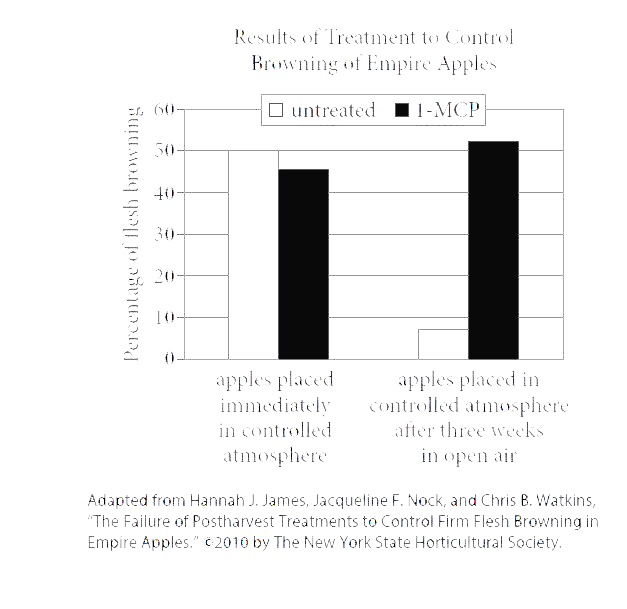
View SolutionHow Do You Like Those Apples? Marketed as SmartFresh, the chemical 1-MCP (1-methylcyclopropene) has been used by fruit growers since 2002 in the United States and elsewhere to preserve the crispness and lengthen the storage life of apples and other fruit, which often must travel long distances before being eaten by consumers. 23 1-MCP lengthens storage life by three to four times when applied to apples. This extended life allows producers to sell their apples in the off-season, months after the apples have been harvested. And at a cost of about one cent per pound of apples, 1-MCP is a highly cost-effective treatment. However, 1-MCP is not a panacea for fruit producers or sellers: there are problems and limitations associated with its use.[1] 1-MCP works by limiting a fruit’s production of ethylene, 24 it is a chemical that causes fruit to ripen and eventually rot. [2] While 1-MCP keeps apples 25 tight and crisp for months, it also limits 26 their scent production. [3] This may not be much of a problem with certain kinds of apples that are not naturally very fragrant, such as Granny Smith, but for apples that are prized for their fruity fragrance, such as McIntosh, this can be a problem with consumers, 27 that will reject apples lacking the expected aroma. [4] But some fruits do not respond as well to 1-MCP as others 28 did, and some even respond adversely. [5] Furthermore, some fruits, particularly those that naturally produce a large amount of ethylene, do not respond as well to 1-MCP treatment. [6] Take Bartlett 29 pears, for instance, unless they are treated with exactly the right amount of 1-MCP at exactly the right time, they will remain hard and green until they rot, and consumers who experience this will be unlikely to purchase them again. 30 Finally, researchers have found that 1-MCP actually increases susceptibility to some pathologies in certain apple varieties. For example, Empire apples are prone to a condition that causes the flesh of the apple to turn brown. Traditionally, apple producers have dealt with this problem by leaving the apples in the open air for three weeks before storing them in a controlled atmosphere with tightly regulated temperature, humidity, and carbon dioxide levels. As the graph shows, the flesh of untreated Empire apples that are first stored in the open air undergoes 31 roughly five percent less browning than the flesh of untreated Empire apples that are immediately put into storage in a controlled environment. However, when Empire apples are treated with 1-MCP, 32 their flesh turns brown when the apples are first stored in the open air, though not under other conditions. Although researchers continue to search for the right combination of factors that will keep fruits fresh and attractive, 33 the problem may be that consumers are overly concerned with superficial qualities rather than the actual freshness of the fruit.
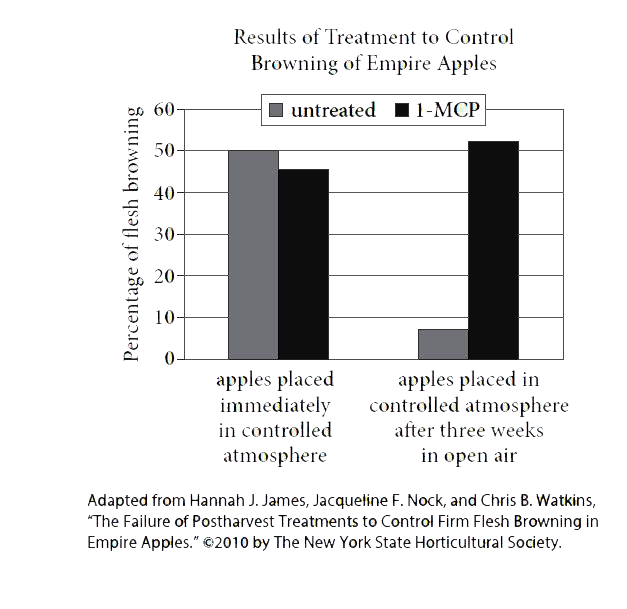
View Solution
